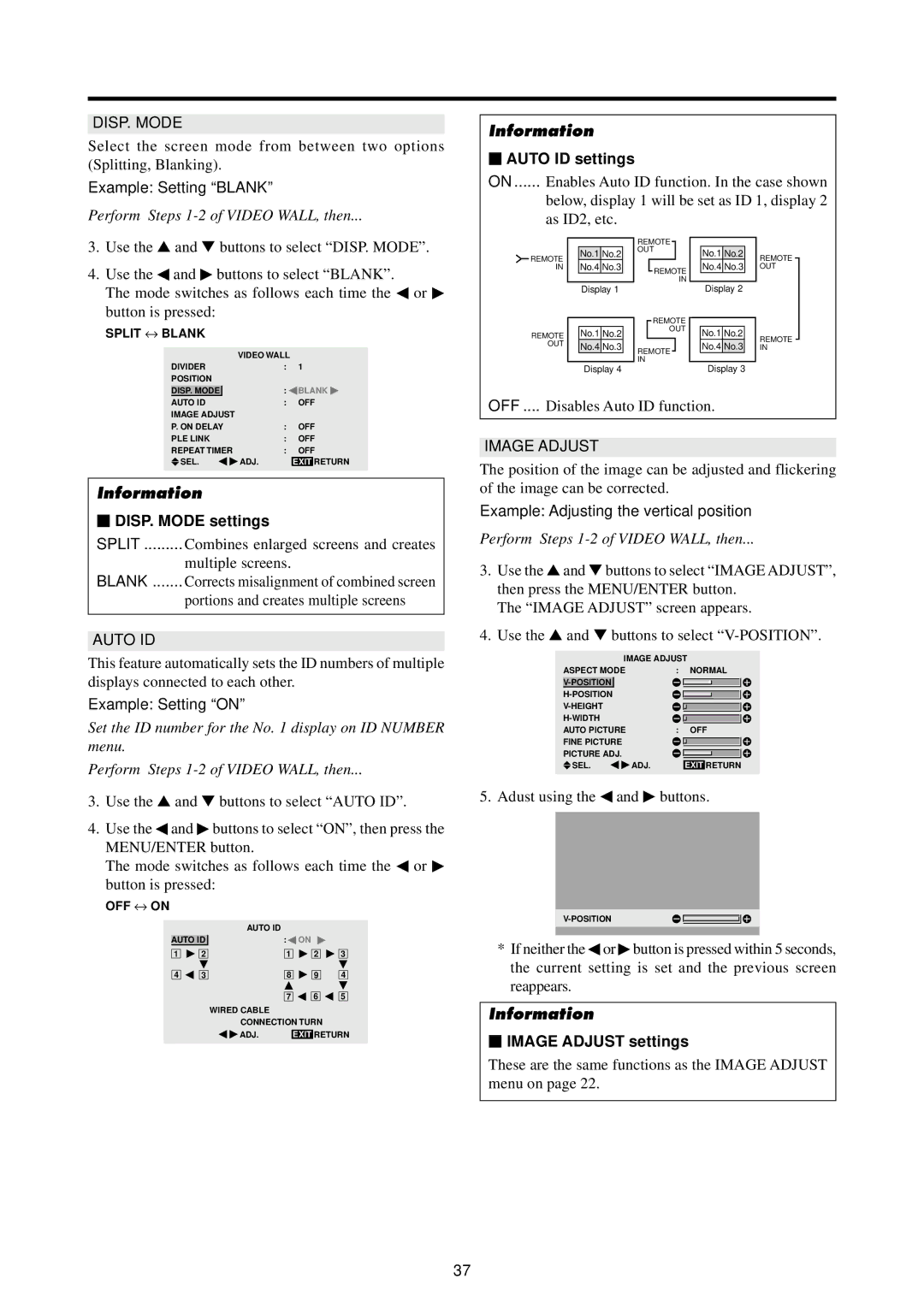
DISP. MODE
Select the screen mode from between two options (Splitting, Blanking).
Example: Setting “BLANK”
Perform Steps 1-2 of VIDEO WALL, then...
Information
⬛AUTO ID settings
ON ...... Enables Auto ID function. In the case shown
below, display 1 will be set as ID 1, display 2 as ID2, etc.
3.Use the ▲ and ▼ buttons to select “DISP. MODE”.
4.Use the ◀ and ▶ buttons to select “BLANK”.
The mode switches as follows each time the ◀ or ▶ button is pressed:
SPLIT ↔ BLANK
|
| VIDEO WALL |
|
DIVIDER | : | 1 | |
POSITION |
|
| |
|
| : | BLANK |
| DISP. MODE | ||
REMOTE IN
REMOTE OUT
No.1 No.2
No.4 No.3
Display 1
No.1 No.2
No.4 No.3
Display 4
REMOTE
OUT
REMOTE
IN
REMOTE
OUT
REMOTE
IN
No.1 No.2
No.4 No.3
Display 2
No.1 No.2
No.4 No.3
Display 3
REMOTE OUT
REMOTE IN
AUTO ID |
| : | OFF | |
IMAGE ADJUST |
|
|
|
|
P. ON DELAY |
| : | OFF | |
PLE LINK |
| : | OFF | |
REPEAT TIMER |
| : | OFF | |
SEL. | ADJ. |
|
| RETURN |
| EXIT | |||
|
|
|
|
|
Information |
|
|
|
|
⬛DISP. MODE settings
SPLIT ......... Combines enlarged screens and creates
multiple screens.
BLANK ....... Corrects misalignment of combined screen
portions and creates multiple screens
AUTO ID
This feature automatically sets the ID numbers of multiple displays connected to each other.
Example: Setting “ON”
Set the ID number for the No. 1 display on ID NUMBER menu.
Perform Steps 1-2 of VIDEO WALL, then...
3.Use the ▲ and ▼ buttons to select “AUTO ID”.
4.Use the ◀ and ▶ buttons to select “ON”, then press the MENU/ENTER button.
The mode switches as follows each time the ◀ or ▶ button is pressed:
OFF ↔ ON
|
| AUTO ID |
|
|
AUTO ID | : | ON |
| |
1 | 2 | 1 | 2 | 3 |
4 | 3 | 8 | 9 | 4 |
|
| 7 | 6 | 5 |
WIRED CABLE
CONNECTION TURN
ADJ. | EXIT | RETURN |
OFF .... Disables Auto ID function.
IMAGE ADJUST
The position of the image can be adjusted and flickering of the image can be corrected.
Example: Adjusting the vertical position
Perform Steps 1-2 of VIDEO WALL, then...
3.Use the ▲ and ▼ buttons to select “IMAGE ADJUST”, then press the MENU/ENTER button.
The “IMAGE ADJUST” screen appears.
4.Use the ▲ and ▼ buttons to select “V-POSITION”.
IMAGE ADJUST
ASPECT MODE |
| : | NORMAL | |||
|
|
|
|
|
| |
|
|
|
|
|
| |
|
|
|
|
|
| |
|
|
|
|
| ||
|
|
|
|
| ||
|
|
|
|
| ||
|
|
|
|
| ||
AUTO PICTURE |
| : | OFF | |||
FINE PICTURE |
|
|
|
|
| |
|
|
|
|
| ||
PICTURE ADJ. |
|
|
|
|
| |
|
|
|
|
| ||
SEL. | ADJ. |
|
| RETURN | ||
| EXIT | |||||
5. Adust using the ◀ and ▶ buttons.
*If neither the ◀ or ▶ button is pressed within 5 seconds, the current setting is set and the previous screen reappears.
Information
⬛IMAGE ADJUST settings
These are the same functions as the IMAGE ADJUST menu on page 22.
37
